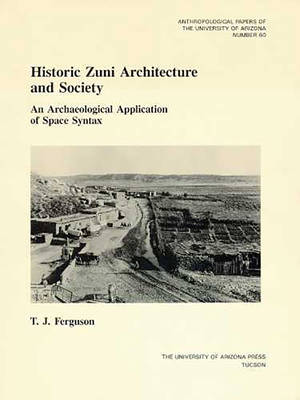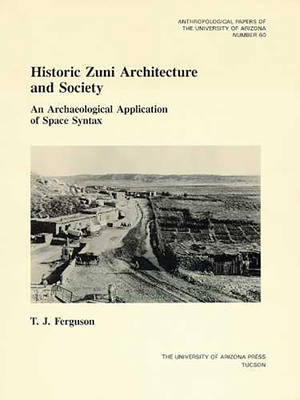
- Afhalen na 1 uur in een winkel met voorraad
- Gratis thuislevering in België vanaf € 30
- Ruim aanbod met 7 miljoen producten
- Afhalen na 1 uur in een winkel met voorraad
- Gratis thuislevering in België vanaf € 30
- Ruim aanbod met 7 miljoen producten
Zoeken
Historic Zuni Architecture and Society
An Archaeological Application of Space Syntax Volume 60
T J Ferguson
€ 32,45
+ 64 punten
Omschrijving
The historic architecture and settlements of the Zuni Indian Tribe in western New Mexico provide an unusual opportunity to investigate social change. In this monograph, the development of historic Zuni society is analyzed by delineating systematic links between the structure of Zuni society and the structure of architectural forms that the Zuni people built to facilitate their activities. Ferguson shows how the structure of open space within Zuni settlements was linked to defense. As long as the Zunis were subject to attack by Spaniards or Navajos, they built settlements that were difficult for outsiders to get into or move around in. As the need for defense waned, settlements became more open and accessible. He also shows how the internal spaces of traditional Zuni houses are oriented around the activities of the women--matriarchs of their families and clans. Federal housing projects tended to spatially isolate the activities of women from interaction with the rest of the household, thus instituting unexpected social change. Historic Zuni Architecture and Society utilizes an interdisciplinary approach, analyzing archaeological data using method, theory, and techniques from the fields of architecture, planning, and ethnology. Archaeologists will find in the book an innovative application of space syntax to archaeological problems, and cultural anthropologists and others interested in the history of the Zuni Indians will value its observations about changes that are currently taking place in Zuni social organization.
Specificaties
Betrokkenen
- Auteur(s):
- Uitgeverij:
Inhoud
- Aantal bladzijden:
- 192
- Taal:
- Engels
- Reeks:
- Reeksnummer:
- nr. 60
Eigenschappen
- Productcode (EAN):
- 9780816516087
- Verschijningsdatum:
- 1/03/1996
- Uitvoering:
- Paperback
- Formaat:
- Trade paperback (VS)
- Afmetingen:
- 216 mm x 279 mm
- Gewicht:
- 526 g

Alleen bij Standaard Boekhandel
+ 64 punten op je klantenkaart van Standaard Boekhandel
Beoordelingen
We publiceren alleen reviews die voldoen aan de voorwaarden voor reviews. Bekijk onze voorwaarden voor reviews.











